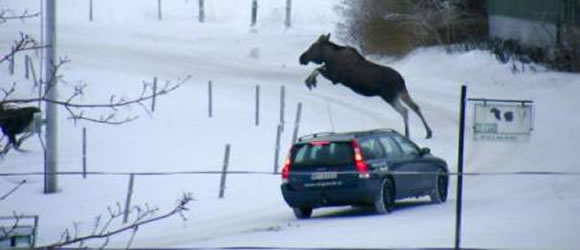
Amazing shot of a moose diving for cover from a loose XC.
Via Jalopnik

Amazing shot of a moose diving for cover from a loose XC.
Via Jalopnik
 The guys who brought us Freakonomics, a book of counter-intuitive stories of crack dealers who live with their mothers and public school teachers who help their students cheat, are at it again with SuperFreakonomics. This time, however, I think they’re stretching their credibility.
The guys who brought us Freakonomics, a book of counter-intuitive stories of crack dealers who live with their mothers and public school teachers who help their students cheat, are at it again with SuperFreakonomics. This time, however, I think they’re stretching their credibility.
They’ve released a few excerpts from the book, and, while I read their first book, I think I’ll pass on the second. One story that has been courting controversy lately is their assertion that child car seats are no better at protecting kids older than two from death than regular seat belts. Since their data investigation proves inconclusive, they conduct their own safety tests. But they admit, since they’re economists and not safety engineers, they really don’t know what they’re doing.
Their study looks at fatality rates and not injury rates. The US Department of Transportation has been freaking out over the coverage ABC News gave to the book, and weights in here. The DOT cites this press release from the Children’s Hospital of Philadelphia:
PHILADELPHIA, Oct. 19 /PRNewswire-USNewswire/ — A study released today in Pediatrics by The Children’s Hospital of Philadelphia offers updated evidence that children ages 4 to 8 who are restrained in the rear seat of a car in a belt-positioning booster seat are 45 percent less likely to be injured in a crash compared with children using a seat belt alone. Furthermore, the study showed there was no difference in the level of protection offered by backless versus high back booster seats. Of those riding in booster seats, children involved in side-impact crashes saw the greatest reduction in injury risk.
Superfreak also covers the economics of prostitution, but, while it’s an interesting topic, it’s not really in line with this blog. Sady Doyle writes an excellent critique of this chapter in the Guardian, followed by Amanda Hess in the Washington City Paper.
The most ridiculous assertion coming out from Dubnerlevitt is that if you’re drunk, you’re better off driving home than walking. They come to this conclusion by using a convoluted analysis of how many miles the average american walks, how many drunk pedestrian fatalities there are each year and compare those numbers to drunk driving fatalities.
Ezra Klein at the Washington Post dissects the analysis:
The next few pages purport to prove that drunk walking is eight times more dangerous than drunk driving. Here’s how they do it: Surveys show that one out of every 140 miles driven is driven drunk. “There are some 237 million Americans sixteen and older; all told, that’s 43 billion miles walked each year by people of driving age. If we assume that 1 out of every 140 of those miles are walked drunk — the same proportion of miles that are driven drunk — then 307 million miles are walked drunk each year.”
“If we assume.”
But why should we assume that? As the initial example demonstrates, a lot of people walk drunk when they would otherwise drive drunk. That substitution alone suggests that a higher proportion of walking miles are drunk miles. Other people walk, or take transit, when they know they’ll be drinking later. That’s why they’re walking and not driving. That skews the numbers and makes it impossible to simply “assume” parity.
In passing the Freakonomics guys mention that drunk walkers aren’t likely to hurt or kill others, unlike drunk drivers. However, factoring in passenger, pedestrian and other driver fatalities brings them to the conclusion that “walking drunk leads to five times as many deaths per mile as driving drunk.” I’d guess that someone who is walking drunk isn’t covering nearly the amount of miles as a driver. As a matter of fact, I’d wager than many of those walking deaths happen within the first mile. And Ezra Klein points out that the walkers are probably in tightly packed urban areas, which are more dangerous to drunk pedestrians than the suburban and rural areas that are more frequented by drunk drivers. These consideration would skew their data further.
Their conclusion is just irresponsible: “So as you leave your friend’s party, the decision should be clear: driving is safer than walking” Yes, they mention you can take a cab, or drink less. But I can comment from personal experience; the best decision is to fold down the rear seats of your station wagon, crack open a window and sleep in the back.
After seeing this video, I have no idea how anyone survived driving in the 1960s. When you combine ridiculous amounts of power with minimal seat belts, no child safety seats and inadequate chassis rigidity, it’s no wonder accident survival rates were so low.
I love my headrest!
Via How We Drive.